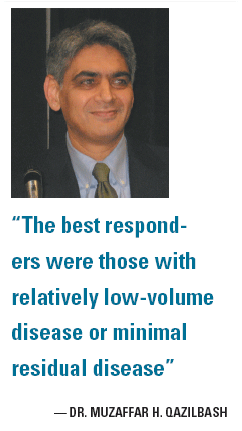Novel peptide vaccine promising in myeloid leukemia
ATLANTA-In a phase I/II randomized trial, a novel leukemia vaccine, PR1 peptide, produced immune responses that correlated with a longer event-free survival.
ATLANTA-In a phase I/II randomized trial, a novel leukemia vaccine, PR1 peptide, produced immune responses that correlated with a longer event-free survival. Responses were durable in high-risk patients with leukemia who had failed prior therapy. Muzaffar H. Qazilbash, MD, of M.D. Anderson Cancer Center, presented the findings at ASH 2007 (abstract 283).
PR1 is an HLA-A2–restricted peptide derived from the myeloid leukemia-associated antigens proteinase 3 and neutrophil elastase.
“These proteins are overexpressed or variably expressed in leukemias and can potentially serve as a good target for the immune system,” Dr. Qazilbash said.
The current trial enrolled 66 HLA-A2+ patients with AML (n = 42), CML (n = 13), or myelodysplastic syndromes (n = 11). Of these patients, 53 had active disease and 13 were in remission.
The first 9 patients were entered onto the phase I portion, while the remaining were randomized to one of three PR1 dose levels, along with GM-CSF. The initial 54 patients received three vaccinations, while the last 12 received six vaccinations.

Immune responses to the vaccine occurred in 25 of 53 (47%) patients who had measurable disease. Clinical responses were seen in 9 of 25 (36%) patients who exhibited an immune response vs 3 of 28 (10%) nonresponders (P = .01).
Immune responders had longer event-free survival than nonresponders (8.7 months vs 2.4 months, P = .03) and a trend toward improved overall survival (not yet reached vs 17 months).
Four of the 13 patients in complete remission have experienced long-term remission for a median of 30.5 months (range, 11 to 59 months). Immune responses have been maintained for as long as 4 years in some patients. “The best responders were those with relatively low-volume disease (< 10% of leukemia blasts in the marrow) or only minimal residual disease as measured by cytogenetic and molecular analyses,” Dr. Qazilbash said.
Multivariate analysis indicated that a low number of bone marrow blasts was a significant predictor of PR1 immune response and longer event-free survival (P < .001). A phase III trial is ongoing in patients with AML in remission.